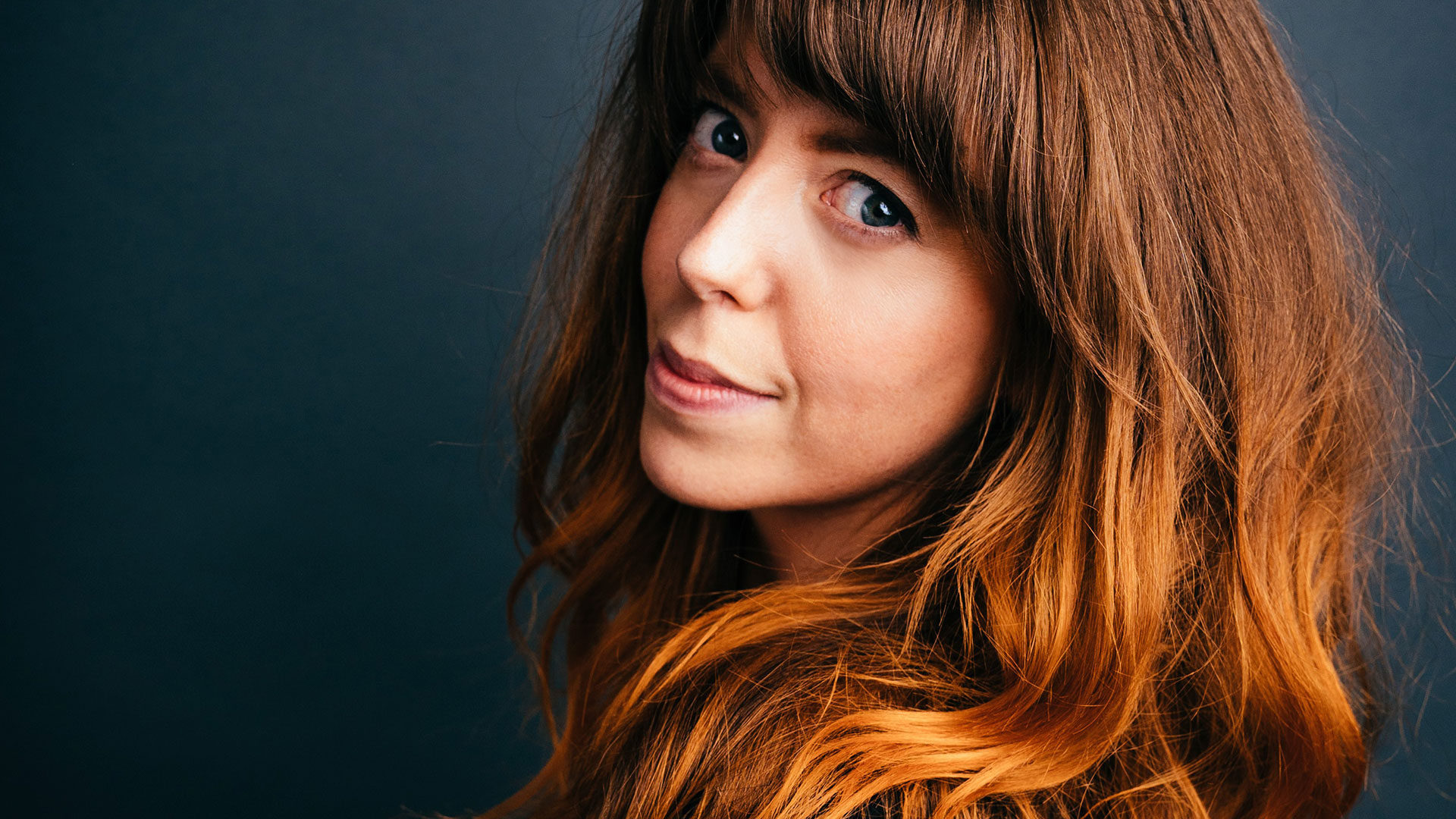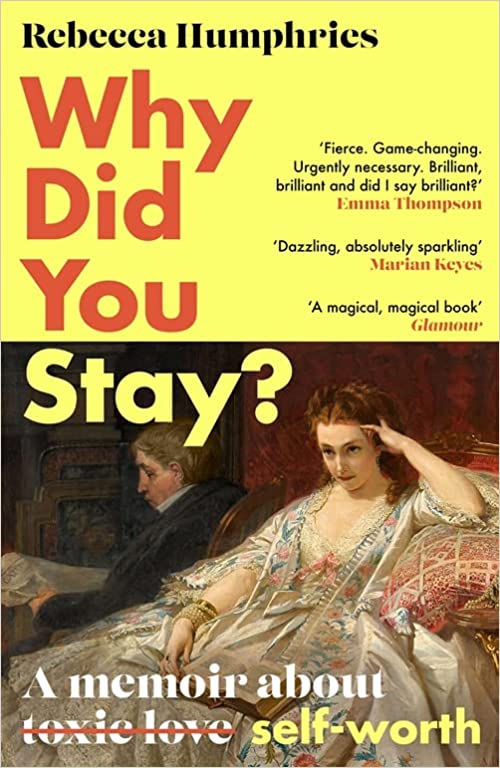You are viewing your 1 free article this month. Login to read more articles.
Actor and writer Rebecca Humphries has penned Why Did You Stay?, a powerful insight into the importance of self-worth
 Caroline Sanderson
Caroline SandersonCaroline Sanderson is a non-fiction writer, editor and books journalist. Her books include a travel narrative, A Rambling Fancy: in the F ...more
Actor and writer Rebecca Humphries has penned Why Did You Stay?, a powerful insight into the importance of self-worth.

Caroline Sanderson is a non-fiction writer, editor and books journalist. Her books include a travel narrative, A Rambling Fancy: in the F ...more
“My name is Rebecca Humphries and I am not a victim.” Actor and writer Humphries had often been called crazy by her stand-up comedian boyfriend. But when paparazzi caught him kissing his “Strictly Come Dancing” partner during the 2018 series of the “biggest show on TV”, she realised that the only crazy thing was her not believing she deserved more from their relationship. What she calls “the bin-fire of all break-ups” followed, amid a tabloid feeding frenzy. Turning down lucrative offers to spill her side of the story, Humphries instead posted a dignified but deadly letter on Twitter, which concluded with advice for others who might be experiencing what she realised she had escaped: a toxic, oppressive relationship. The tweet went viral. But among the replies was one which enquired: “If he was that bad, why did you stay, eh?”
The unflinching but also frequently hilarious Why Did You Stay? A Memoir About Self-Worth is Humphries’ riposte to that question. This brilliant book is not a kiss ’n’ tell, or even a kiss my ass ’n’ tell. Neither is it the revenge tragedy it could have been, although in a pointed disclaimer at the beginning, Humphries tells “anybody that feels this book has been inspired by their actions” that she humbly accepts their “gratitude for the things I have graciously opted to omit”. Written in diary form, it alternates episodes from her relationship with her ex (referred to only as He and Him throughout) with an account of its aftermath; showing not only how difficult it can be to get perspective on a relationship while on the inside, but also how easily lines are crossed if we don’t keep a strong sense of self-worth.
I have a long-held belief that popular culture has a lot to answer for in the way that it represents women
When we chat via Zoom, she is just back in London from LA, where she has been promoting the Amazon Prime Video series “Ten Per Cent”, the UK re-creation of French show “Call My Agent”. I begin by asking her at what point she began to think there might be a book in her experiences. “When I put my Twitter statement out, I was approached to do interviews for every TV and radio station, write think pieces for every newspaper. I also had book deals dangled in front of me. But I felt so strongly that I wasn’t able to represent myself in the right way at that point. I didn’t have what I now know I needed, which was the gift of perspective; the time to look at things in hindsight and understand what I had learned.”
Fast forward to the pandemic and, finding herself unemployed, Humphries did “what every actor does when they’ve been out of work for a few months”: work her way through The Artist’s Way by Julia Cameron. “While I was doing it, the idea of writing a book just kept coming up. So I started writing and structuring how it might look, using episodes from my life which I now understand were quite crucial in my growth process.” Humphries also signed up to a memoir-writing course at Curtis Brown and received encouraging feedback there, and from agent Cathryn Summerhayes. When the book went out on submission, a two-hour phone conversation about relationships with Emily Barrett convinced Humphries that the Sphere publishing director “got the book in a profound way”.
Why Did You Stay? is indeed a profound book about how our fear of rejection leads us (and by us, I mean primarily but not exclusively women) to settle for a state of affairs where “your expectations of what love looks like just get lower and lower until you think that love is this low-level thing that you’re trying to keep alive”. I ask Humphries why she thinks this is. “I have a long-held belief—threaded through this book—that popular culture has a lot to answer for in the way that it represents women. What’s so fascinating about what happened to me is that I’ve been obsessed with pop culture since I was about three, and suddenly in 2018, I found myself inside it, and expected to be dignified in a way that actually meant silent and voiceless. I was like: ‘That isn’t who I am! I have every right to assert myself!’”
While she revisits other formative relationships with men in Why Did You Stay?, which also loops back to her childhood and adolescence growing up in Norwich, Humphries also expands its scope to examine the broader treatment of women, particularly in the wake of #MeToo. “My initial reaction to #MeToo was to think: I’ve never been taken advantage of sexually in my career. But then in the wake of what happened in 2018, I realised that I absolutely have been exploited and intimidated in my career as well in my personal life. It’s not just about men who take their robes off and get their dicks out in hotel rooms. It’s about insidious control and power games. When I put my Twitter statement out, so many women reached out to me, even approaching me in the street to say how much they connected with my experience.”
While Why Did You Stay? contains some shocking examples of such control, and of how women are “conditioned for co-dependency”, it is also, strikingly, a rare celebration of platonic friendship, for, in the wake of the break-up, her friends, male and female, rallied around her in a show of love and the utmost loyalty. “It’s seldom thought about, that kind of love, because so much of our onus is on romantic relationships. Whereas if you look laterally, you see all this love and respect that’s in your life the whole time, from people who accept you for exactly who you are.”
Despite its traumatic origins, Humphries’ remarkable achievement with Why Did You Stay? is to have written a book that is colourful, creative and, above all, funny. I ask her whether she set out to make it so. “Well, I’ve always been a comedy actress, and all of my heroines are hilarious: Nora Ephron, Caitlin Moran, Emma Thompson, Marian Keyes. This book could have been all sorts of things, but I absolutely knew that if I was going to step into the arena and say: ‘I want to have a conversation about what gaslighting and coercive control look like’, I knew I had to use the same voice with which I might talk to my friends about it. I want people to engage with this stuff because they can imagine themselves having a pint or an Oyster Bay with me.”
Extract
I never wanted to write a book. All I ever really want to do, at any given moment, is dance about to gay songs. But I need to. I need to do it because several years after surviving a relationship (one that culminated in the bin-fire of all break-ups) I am still seeing with my own eyes some of the coolest, cleverest, sexiest women allowing their brilliance to be drained in the name of love. I need to do it because as Jane Fonda says: ‘Once you know what’s wrong and you stay silent, you’re part of the problem.’
And although no one actually has to answer a BS, victim-shaming question like ‘Why Did You Stay?’, I hope that my choice to reclaim it will empower anyone who feels as lonely in their story as I once did in mine.
But this is as much a story of how I left it behind me as why I stayed. Because what defines you in life isn’t what happens to you, but how you deal with it.
Like Lisa Taddeo’s Three Women (also published in July, in 2019), Why Did You Stay? is set to be this summer’s smart female read for women of all ages: passing my proof to my 20-year-old daughter gained this book another early super-fan. What are Humphries’ hopes for it? “I’m not the first person to speak about these issues and I definitely won’t be the last. But I hope the fact that ‘Strictly’ was the catalyst will give this book a wide reach. Someone might pick it up because they think it’s going to be full of salacious ‘Strictly’ gossip but then find themselves engaging in a story about what it is to be a woman, and hopefully having a laugh as well. When people say to me: ‘“Strictly” sort of saved your life, didn’t it?’, I always correct them and say: ‘Actually, I saved my own.’”






